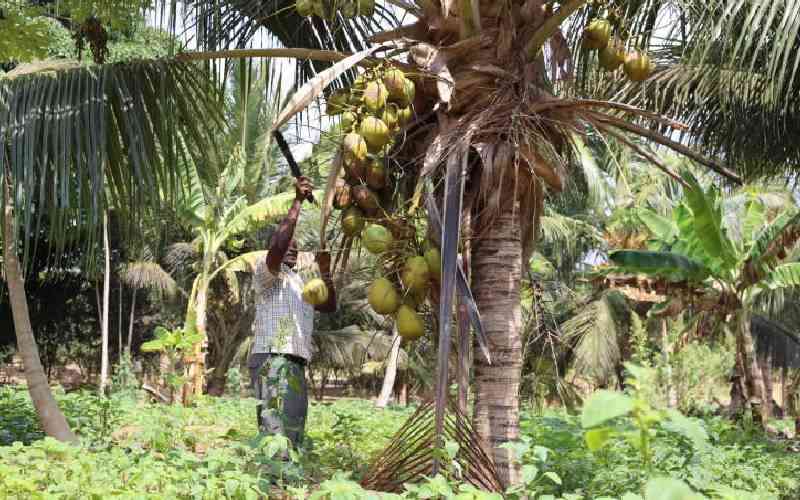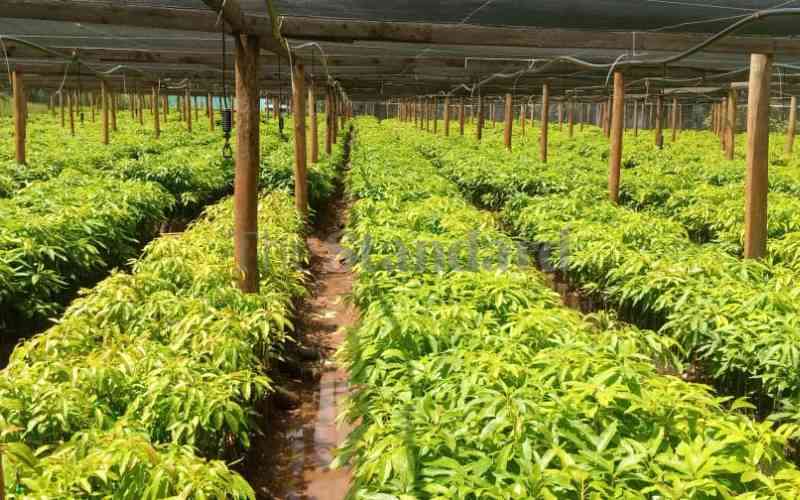
By Frankline Sunday
Most business ideas arise from the desire to meet the need of a particular customer base looking for a specific good or service. However, some businesses ideas transcend an entrepreneur’s intended immediate customer base and have national impact.
Agro-forestry is one such venture, and Mr Benson Kanyi is among a growing number of Kenyans making a living out of commercially producing trees. This group swears by agro-forestry being a profitable and sustainable business that also meets a national need.
Knowledge transfer
“The market for trees is large, and about 18,000 local farmers owning about two acres of land each are making a good living growing and selling trees, especially the fast-maturing eucalyptus,” says Mr Kanyi.
Eucalyptus has not had the best of reputations in recent years, but most farmers who had a bad experience with it planted a variety unsuitable for their land’s soil type and prevailing climate.
Kanyi is an official of the Tree Biotechnology Programme Trust (TBPT), a public and private sector partnership that provides knowledge transfer to farmers and entrepreneurs who desire to venture into commercial tree planting.
Kenya currently has just about 46,000 acres under private commercial tree farming, which is hardly enough to feed the booming demand for timber for construction, biomass energy and printing.
In addition, the Government is hard pressed to effect the rural electrification programme and get more people onto the national electricity grid.
Exporting jobs
“It is unfortunate that Kenya, with its good climate and potential for commercial tree farming, is still talking about unemployment when, at the moment, it is exporting jobs to neighbouring countries by importing electricity transmission poles,” says Kanyi.
Data from the United Nations Environment Programme (Unep) shows that in 2009 and 2010, Kenya lost Sh6.6 billion and Sh5.8 billion, respectively, to deforestation.
With the country’s water catchment areas in the Mau Forest, Mts Kenya and Elgon, the Aberdares and the Cheranganyi Hills shrinking from illegal logging and urban development, it is imperative Kenya finds alternative sources of timber.
For investors like Mr Habil Onyango, a Nairobi-based businessman with three acres under eucalyptus in his home district of Bondo, the demand for timber saw him uproot two acres of maize crop in 2009 to plant 4,000 eucalyptus seedlings.
Stay informed. Subscribe to our newsletter
“I had taken my nephews to visit Kisumu’s ASK agricultural show in 2009 and I got a pamphlet about commercial tree planting from the Kenya Forestry Services (KFS) stand,” he says.
Mr Onyango’s interest was piqued, and a week later, he got an officer from KFS to visit his farm and advise him on the best tree variety to plant.
“I started my tree farm with 1,000 eucalyptus seedlings, which I bought for Sh15 each,” says Onyango.
“I later decided to go all in and uprooted the maize I had, which was not doing very well, and planted 3,000 more seedlings.”
Two years later, his first batch of eucalyptus crop was about 12-feet long and he sold the trees at a local timber yard for Sh2,000 each, earning him Sh1,800, 000.
“Some of the trees dried up and others were destroyed by ants, but I still made more than enough money to cover the loan I had taken to prepare and fence the land and buy inputs,” he says.
There are several varieties of eucalyptus trees, and their seedlings retail at between Sh15 and Sh25. Some can be harvested from as early as 18 months, and each trunk sold as construction material for as much as Sh3,000.
Electricity poles
Others can take up to nine years to mature fully and fetch Sh18,000 when sold to Kenya Power for electricity poles.
There is the Eucalyptus grandisX camaldurensis, which is ideal for marginal areas, and other pure breeds for high yield areas such as the highlands.
“We are soon going to offer the much more heat-tolerant hybrid eucalyptus grandisX urophylla from South Africa that has been undergoing testing in Kenya the last six years,” says Kanyi.
“This species has a better diameter, produces more biomass within a relatively short time and has more tolerance to common pests.”
For more information on the companies profiled here, email [email protected]
 The Standard Group Plc is a
multi-media organization with investments in media platforms spanning newspaper
print operations, television, radio broadcasting, digital and online services. The
Standard Group is recognized as a leading multi-media house in Kenya with a key
influence in matters of national and international interest.
The Standard Group Plc is a
multi-media organization with investments in media platforms spanning newspaper
print operations, television, radio broadcasting, digital and online services. The
Standard Group is recognized as a leading multi-media house in Kenya with a key
influence in matters of national and international interest.
 The Standard Group Plc is a
multi-media organization with investments in media platforms spanning newspaper
print operations, television, radio broadcasting, digital and online services. The
Standard Group is recognized as a leading multi-media house in Kenya with a key
influence in matters of national and international interest.
The Standard Group Plc is a
multi-media organization with investments in media platforms spanning newspaper
print operations, television, radio broadcasting, digital and online services. The
Standard Group is recognized as a leading multi-media house in Kenya with a key
influence in matters of national and international interest.









